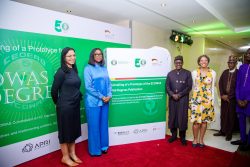A New Way Forward: ECOWAS writes its handbook together
What if you could transform your team’s collective expertise into a published handbook in just a few days?
This is exactly what the Economic Community of West African States (ECOWAS) did in a recent Book Sprint last July. In a bold shift from tradition, ECOWAS set aside familiar structures to embrace a collaborative approach to writing—bringing together voices from across the institution to co-author a milestone handbook.
Last July, our facilitators Alysa Khouri and Baba Dodo traveled to Accra, Ghana to run a Book Sprint with 18 ECOWAS staff members—colleagues representing a wide range of departments, from policy and communications to youth engagement, legal affairs, and technical coordination.Many of them had never worked together before. Some had been with ECOWAS for years, while others were relatively new to their roles. Some were more comfortable working in English, others in French. But they were all united by a common goal: to co-author a new institutional handbook that tells the story of ECOWAS’s mission, evolution, and vision for the future.
The result was ECOWAS 360 Degrees—a full draft of the handbook written entirely by the team in just four days.
The idea behind the Sprint was simple, but powerful: instead of outsourcing this work, the knowledge would come from within. The people who do the work every day would be the ones to shape how that work is shared—with one another, and with the broader public.
Respecting structure while inviting new voices
The group’s energy, expertise, and dedication were evident from day one. While there was an initial shared sense of uncertainty about how individual perspectives would “fit” in a collective writing space, Vice President Damtien Tchintchibidja opened the Sprint reinforcing the importance of the work ahead and setting the tone for an open, participatory process. This visible support from leadership established early trust and gave participants the confidence to lean into something new.

Some drafted in French, others in English. Revisions happened side by side. The facilitators helped guide the rhythm of the week—encouraging the group to balance speed with reflection, and reminding them that the goal wasn’t to write the perfect book. It was to create something meaningful together.
And somewhere between outlining the past and imaging the future, the tone shifted and the collaboration grew stronger. “People started to write with heart,” facilitator Alysa Khouri noted. In group discussions and breakout sessions, teams explored new topics, offered feedback, and shared ideas beyond their usual roles. Everyone contributed to shaping the chapters, not just from their professional expertise but from a shared investment in the institution’s story. Department boundaries became more fluid —moving from parallel efforts to collective ownership. By the end of Day 4, the team had written a working draft that traces ECOWAS’s story over the last 50 years, outlines its institutional structures, and looks ahead to key regional priorities—governance, youth development, digital infrastructure, climate security, and more.
But beyond the book itself, what stood out was how the process helped connect people across teams. For many, it offered a new perspective—on how different departments see ECOWAS’s role, and how those perspectives strengthen the bigger picture when they’re brought together.
Participants stepped outside their usual roles and discovered new ways of understanding each other’s work. They built a shared perspective—one that doesn’t often emerge in meetings or memos, but comes from the act of building something together.
In the end, ECOWAS didn’t just walk away with a book. They walked away with a new way of working—even if just for four days. One grounded in trust, shaped by collaboration, and guided by a belief that institutions grow stronger when they speak in their own voice.
Learn more about the Book Sprint methodology.
